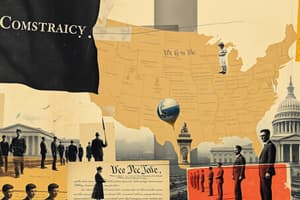Podcast
Questions and Answers
Which of the following statements accurately describes the purpose of the Bill of Rights?
Which of the following statements accurately describes the purpose of the Bill of Rights?
- It delineates the regulations on interstate commerce.
- It outlines the powers of each government branch.
- It establishes the framework for the federal government.
- It protects individual freedoms such as speech and religion. (correct)
What is meant by 'checks and balances' in the context of the Constitution?
What is meant by 'checks and balances' in the context of the Constitution?
- A procedure to amend the Constitution effectively.
- A system that allows one branch to dominate others.
- The power is equally distributed among all branches.
- Each branch has mechanisms to limit the powers of the others. (correct)
Which amendment is concerned with Congressional salary adjustments?
Which amendment is concerned with Congressional salary adjustments?
- 27th Amendment (correct)
- 19th Amendment
- 1st Amendment
- 25th Amendment
How does the Constitution address changes in societal issues?
How does the Constitution address changes in societal issues?
What issue did states face that led to interstate disputes prior to the Constitution's establishment?
What issue did states face that led to interstate disputes prior to the Constitution's establishment?
What does the term 'Democracy' specifically mean?
What does the term 'Democracy' specifically mean?
Which of the following is NOT a gateway to democracy?
Which of the following is NOT a gateway to democracy?
Which barrier to democracy involves actions that prevent people from voting?
Which barrier to democracy involves actions that prevent people from voting?
What principle ensures that all individuals and institutions are accountable under the law?
What principle ensures that all individuals and institutions are accountable under the law?
Which concept emphasizes personal freedoms within American culture's influence on democracy?
Which concept emphasizes personal freedoms within American culture's influence on democracy?
Which duty as citizens encompasses both participating in elections and staying informed?
Which duty as citizens encompasses both participating in elections and staying informed?
What was a main weakness of the Articles of Confederation regarding government structure?
What was a main weakness of the Articles of Confederation regarding government structure?
What does the principle of popular sovereignty imply?
What does the principle of popular sovereignty imply?
Flashcards are hidden until you start studying
Study Notes
Democracy Basics
- Originates from Greek words: "Demo" (people) and "Cratos" (power), meaning "rule by the people."
Types of Democracy
- Direct Democracy: Citizens directly participate in decision-making processes.
- Representative Democracy: Citizens elect representatives to make decisions on their behalf.
Gateways to Democracy
- Free Speech: Enables individuals to express opinions without fear.
- Voting: Key mechanism for citizens to choose leaders and influence laws.
- Media Access: Essential for information dissemination and promoting government transparency.
Barriers to Democracy
- Voter Suppression: Efforts to inhibit or deter voter participation.
- Gerrymandering: Manipulation of electoral boundaries to benefit specific political parties.
- Lack of Education: Low understanding of the democratic process impacts participation levels.
Enlightenment Influence on America
- Popular Sovereignty: Government power derives from the consent of the governed.
- Rule of Law: Ensures accountability and that all individuals are subject to law.
Liberty and Rights
- Protection of Rights: Safeguards individual freedoms from governmental interference.
American Culture’s Influence on Democracy
- Liberty: High value placed on personal freedoms.
- Equality: Belief in equal rights and opportunities for all citizens.
- Individualism: Emphasis on individual rights and self-reliance.
- Civic Duty: Encouragement for participation in community and civic life.
Duty as Citizens
- Voting: Essential participation in elections.
- Staying Informed: Importance of being knowledgeable about current issues.
- Obeying Laws: Requirement to adhere to legal rules and regulations.
- Serving on Jury Duty: Civic responsibility in the judicial process.
- Engaging in Conversation: Participation in discussions on societal issues.
Weaknesses of the Articles of Confederation
- Weak Central Government: Insufficient authority to enforce laws or levy taxes.
- No Executive Branch: Absence of leadership for law implementation.
- Interstate Disputes: State self-interest led to conflicts and ineffective governance.
- Economic Issues: Inability to manage commerce or address national debt.
Key Components of the Constitution
- Bill of Rights: First ten amendments protecting individual freedoms and rights.
- Amendments: Allow changes or additions to the Constitution.
Protection by the Bill of Rights and Constitution
- Bill of Rights Protections: Guarantees freedoms like speech, religion, assembly, fair trials, and protection against unreasonable searches.
- Constitution Framework: Establishes federal government structure, delineates powers, and introduces checks and balances.
Power Distribution Among Government Branches
- Checks and Balances: Ensures no single branch (Legislative, Executive, Judicial) can overpower the others.
Constitution as a Living Document
- Amendable Nature: Adaptable to address evolving societal issues.
Last Amendment
- 27th Amendment: Prohibits changes to Congressional salaries from taking effect until the next congressional session.
Studying That Suits You
Use AI to generate personalized quizzes and flashcards to suit your learning preferences.




